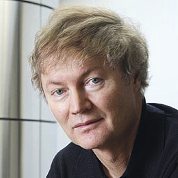 Prof. Michael Graetzel from the Ecole Polytechnique Fédérale de Lausanne (EPFL), receives this year’s Diels Planck Lecture Award of KiNSIS (Kiel Nano, Surface and Interface Science), a priority research area of Kiel University. The interdisciplinary research association thus honors his outstanding research in the field of photochemistry.
Prof. Michael Graetzel from the Ecole Polytechnique Fédérale de Lausanne (EPFL), receives this year’s Diels Planck Lecture Award of KiNSIS (Kiel Nano, Surface and Interface Science), a priority research area of Kiel University. The interdisciplinary research association thus honors his outstanding research in the field of photochemistry.
Prof. Graetzel is regarded as the inventor of a new type of efficient solar cell that can be manufactured particularly costeffectively. This is the seventh time that KiNSIS has honored internationally renowned scientists in the nano and surface sciences for extraordinary research across the boundaries of disciplines. The award ceremony and a ceremonial address took place on September 15, 2020 virtually as part of the online conference “27th Lecture Conference on Photochemistry” of the Gesellschaft Deutscher Chemiker (GDCh). The functionality of the so-called “Graetzel cell” mimics the natural process of photosynthesis in plants. The role of the natural dye chlorophyll is taken over by sensitizing artificial dye molecules: they transfer electrons to a network of nanoparticles of semiconductor oxides, which generates electrical energy. In contrast to conventional solar cells made of highly pure and expensive silicon, relatively inexpensive materials are used for the Graetzel cell. In their further development, the organic dyes have now been replaced by the material perovskite and the liquid electrolyte by organic semiconductors. Today, the so-called perovskite solar cells achieve an efficiency of more than 25% in converting sunlight into electricity and are thus characterized by both efficiency and stability.
Source: actu.epfl.ch/news
Céline Wittwer, SCS
25.10.2020
